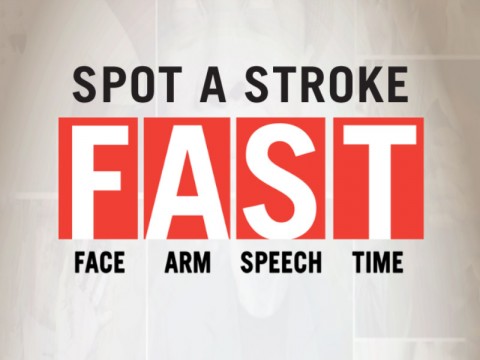http://www.clarksvilleonline.com/2016/10/21/american-stroke-association-urges-everyone-learn-fast-response-stroke-world-stroke-day/
Dallas, TX – When punch dribbled out of the side of Dan Merritt’s mouth during a Halloween celebration at his daughter’s house, his wife quickly recognized stroke signs and drove him to the hospital.
“In hindsight, we did the right thing, the wrong way,” Barbara Merritt said. “We should have called 911 right away. Fortunately, Dan’s story turned out okay, but we know we got incredibly lucky.”
Lucky, because people who don’t go to the hospital via EMS reduce the odds of getting the best treatment for stroke, according to recent American Heart Association/American Stroke Association Get With The Guidelines-Stroke data.
For World Stroke Day on October 29th, the American Stroke Association will join others across the world to encourage people to save lives by responding promptly to stroke — the second leading cause of death worldwide.
“As a healthcare professional and as a stroke survivor myself, I can tell you that getting help quickly for stroke is more important than anything else you may be doing or have planned,” said Teri Ackerson, neuroscience program coordinator at Saint Luke’s Health System in Kansas City, Missouri and American Heart Association/American Stroke Association volunteer. “Whether you are the one experiencing symptoms or you see them in someone else, remember that stroke won’t wait, and neither should you.”
People reported varying reasons for delaying stroke treatment in an informal survey of American Stroke Association website visitors:
- Several hoped symptoms would resolve on their own.
- Many had other priorities, including finishing work, meeting up with family or even a scheduled hair appointment.
- Some expressed an outdated, fatalistic view of the disease.

Many ischemic strokes, which account for 87 percent of all strokes and are caused by an obstruction of blood flow to the brain, can be treated with the clot-busting medication tissue plasminogen activator (IV r-tPA/alteplase) and a stent retriever device that removes the clot.
Research has shown that 91 percent of eligible stroke patients treated with IV r-tPA and a stent retriever in two and a half hours or less had minimal or no disability.
“The same person who would have suffered a severely disabling or fatal stroke a few years ago now commonly walks out of the hospital a few days later,” said Alexander Khalessi, M.D.(12% is not common), director of neurovascular surgery at the University of California, San Diego and national spokesperson for the American Stroke Association’s Together to End Stroke initiative. “Decades ago there were no treatments for stroke. Now we have therapies that may interrupt even the most severe and disabling stroke if we can get to it in time.”
Through Together to End Stroke, nationally sponsored by Medtronic, the American Stroke Association teaches the acronym F.A.S.T. as an easy way to remember the most common stroke warning signs and how to respond: Face drooping, Arm weakness, Speech difficulty, Time to call 911.
For more information on stroke treatment and World Stroke Day resources, visit StrokeAssociation.org.
Additional Resources
- World Stroke Day infographic, Hearty Humor cartoon, F.A.S.T. infographics, and brain images are located in the right column of this release.
- View this release in Spanish
About the American Stroke Association
The American Stroke Association is devoted to saving people from stroke — the No. 2 cause of death in the world and a leading cause of serious disability. We team with millions of volunteers to fund innovative research, fight for stronger public health policies, and provide lifesaving tools and information to prevent and treat stroke. The Dallas-based association was created in 1997 as a division of the American Heart Association.To learn more or to get involved, call 1.888.4STROKE or visit StrokeAssociation.org. Follow us on Facebook and Twitter


No comments:
Post a Comment